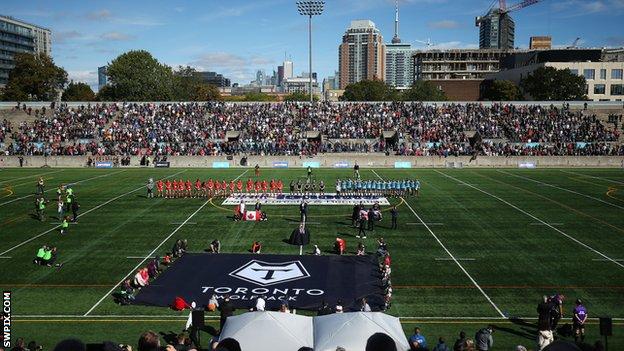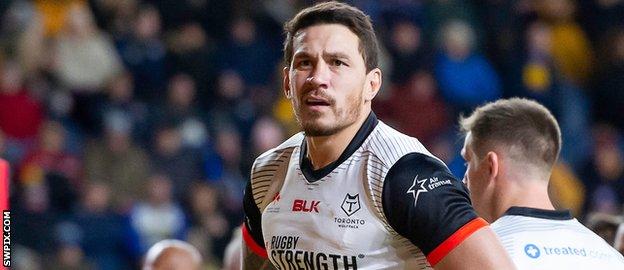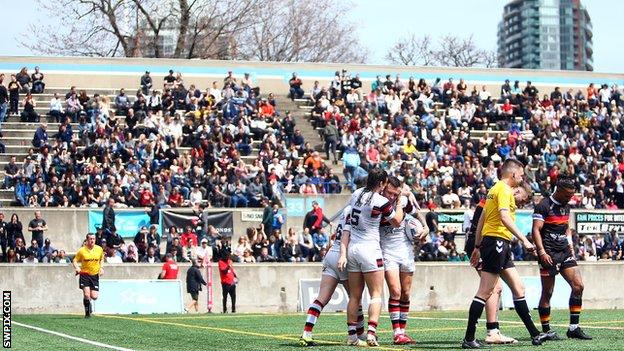
[ad_1]

Rugby League must decide whether it is serious about growing the game, before deciding the future of the Toronto Wolfpack, according to ex-St Helens and Wolfpack back-rower Jon Wilkin.
After withdrawing from Super League 2020, the Wolfpack’s re-entry for next season is to be decided by a vote between the remaining 11 member clubs.
And Wilkin fears some clubs may vote to cast the Canadian club adrift, based on their own short-term financial needs rather than what’s good for the sport as a whole.
“This is a very important moment for the sport to deeply assess its mentality,” Wilkin told BBC Sport.
“There are some big challenges for the sport financially, this is an opportunity to back a franchise that is growing and has the potential to bring new fans into the game. Or not back it.”
Future up in the air for Wolfpack

Toronto’s future in the game was cast into doubt by this year’s withdrawal, after owner David Argyle cited overwhelming financial challenges posed by the coronavirus pandemic.
Argyle has since walked away from the club, and new owner Carlo LiVolsi has submitted a blueprint for re-admission into Super League for 2021, that was discussed by clubs last week.
Super League’s chief executive Robert Elstone said the submission required greater clarity and LiVolsi has been invited to make a personal presentation to clubs and the SL board in the next couple of weeks.
But Wilkin, who signed for Toronto last year and helped them win promotion to the top flight for the first time, fears some clubs have already made up their mind.
“There are conversations going on here saying Toronto have put up some numbers that don’t quite stack up, that David Argyle left a smudge on the game for pulling out mid-season – all of this is nonsense,” the 36-year-old said.
“Some clubs have spotted an opportunity to get paid a little more next year and are pushing for 11 teams in the league just so they get more money.
“The game has been defined by its weakest members for a long time. It’s got to be more than about emotion. There has got to be some sort of rational thought by the leadership.”
Build and thrive

The sight of almost 10,000 fans crammed into Toronto’s Lamport Stadium for lastr season’s Championship promotion final – dubbed the Million Pound Game – showed just how far the club had come in just three seasons with its marketing and promotion of the sport.
Regular, enthusiastic crowds and an entertainment-driven matchday experience was something visiting Championship and League One clubs enjoyed, but Toronto’s winter weather meant no Super League fans were able to make the trip across the Atlantic before Covid-19 brought the campaign to a halt.
Toronto have had a large cost base since they entered the league system, as part of their initial agreement to join, which includes funding the travel for visiting clubs and match officials.
In return, they received no central funding, so any change to that system would require clubs to relinquish some of their existing chunk of money from the Super League in order to facilitate it.
“It’s got to be more than about money,” former Great Britain and England international Wilkin said. “I think the game has backed itself into a corner. If you let Toronto back into Super League, then you have got to back it for a time and do what they did with Catalans and give it a few years to settle in.
“To quote every politician in the world at the minute, we’re in unprecedented times and it’s tough trading conditions for all clubs. If we didn’t have furlough [the government’s job retention scheme], there would have been another couple of clubs up the wall now.
“The TV distribution is shared by 11 clubs and lets be frank, there are five or six clubs who are not willing to give up £100,000 next year to explore the growth of the game.
“And below that there are maybe 10 or 12 clubs who’ve played the game for 125 years saying ‘It’s our turn in the top flight’.”
Strong leadership – either way

The balance between supporting the game’s existing heartlands and reaching new frontiers is a long-standing concern for rugby league, and an important consideration for the current stakeholders and the governing body.
“It needs leadership and someone to say, ‘No, we’re backing expansion’, or, ‘No, we’re going to be a traditional northern sport and we’re going back to build a solid base.’,” Wilkin continued. “There’s just none of that going on. And that’s what frustrates me.
“Wait until this furlough scheme finishes. Trust me, there’ll be a different world going forward. Teams are going to get stripped of squad size, we’re going to have lads released, there’s going to be a cutting of costs.
“What’s the plan? Where are we going? How are we going to grow? Are we just going to stand still and grow our base. Crowds are going down and viewing figures are going down, that’s been a fact for the last couple of years. How are we going to introduce a new generation of fans?
“I’m really biased and I know I’m going to get shot down for this, but Toronto is an interesting opportunity. I’m really frustrated clubs didn’t get out there because had clubs got out there they’d have a different opinion.”
[ad_2]
Source link